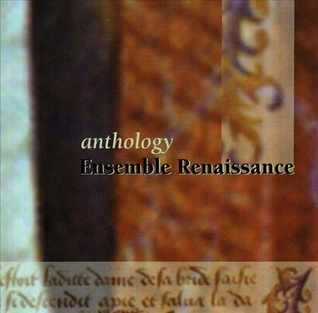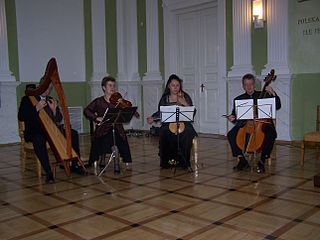Related Research Articles

The music of Catalonia comprises one of the oldest documented musical traditions in Europe. In tandem with the rest of Western Europe, it has a long musical tradition, incorporating a number of different styles and genres over the past two thousand years.

Jordi Savall i Bernadet is a Spanish conductor, composer and viol player. He has been one of the major figures in the field of Western early music since the 1970s, largely responsible for popularizing the viol family of instruments in contemporary performance and recording. As a historian of early music his repertoire features everything from medieval, Renaissance and Baroque through to the Classical and Romantic periods. He has incorporated non-western musical traditions in his work; including African vernacular music for a documentary on slavery.
Sarband is a German early music ensemble with musicians from 7 nations, focusing on musical connections between Orient & Occident; Jewish, Christian & Muslim music. The group was founded in 1986 by Dr. Vladimir Ivanoff. Since then, Sarband has performed more than 500 concerts on four continents and released 14 CDs.

Hespèrion XXI is an international early music ensemble. The group was formed in Basel, Switzerland in 1974 as Hespèrion XX by Catalan musical director Jordi Savall, his wife Montserrat Figueras (soprano), Lorenzo Alpert, and Hopkinson Smith. The group changed its name to Hespèrion XXI at the beginning of the 21st century. The name "Hespèrion" is derived from a word in Classical Greek which referred to the people of the Italian and Iberian peninsulas.
Philip Pickett is an English musician. Pickett was director of early music ensembles including the New London Consort, and taught at the Guildhall School of Music and Drama. He played recorders, shawms and similar instruments. In February 2015, Pickett received an 11-year prison sentence for the rape and sexual assault of pupils at the school.

The Llibre Vermell de Montserrat is a manuscript collection of devotional texts containing, amongst others, some late medieval songs. The 14th-century manuscript was compiled in and is still located at the monastery of Montserrat outside Barcelona in Catalonia, Spain.
Ensemble Micrologus is an Italian group that performs vocal and instrumental medieval music, including both religious and secular pieces from the 12th to the 16th century in their repertoire.
Montserrat is a British Overseas Territory in the Caribbean whose name comes from the Montserrat mountain in Catalonia.
Psallentes is a Gregorian chant ensemble founded in 2000 and based in Leuven, Belgium.
Ad Mortem Festināmus is a monodic song from the 1399 manuscript Llibre Vermell de Montserrat. Its lyrics deal with the inevitability of death and the need to stop sinning. Its first few verses overlap with those of “Scribere Proposui”, a song from the 1582 Piae Cantiones. It has been recorded by a variety of artists, including the electronic neo-medieval act Qntal, that gave new music to the lyrics and made it a club hit in 1992.
Stella splendens is a polyphonic song, with two parts voices from the Llibre Vermell de Montserrat, one of the oldest extant medieval manuscripts containing music.
O Virgo Splendens is a monodic song from the Llibre Vermell de Montserrat, one of the oldest extant medieval manuscripts containing music.
Capella de Ministrers is an early music group formed in 1987 in Valencia, Spain, by Carles Magraner. Valencian music is prominent in its repertoire.
Companyia Elèctrica Dharma is a Catalan band. Many of its members are brothers, from the district of Sants, in the city of Barcelona. They have performed in Europe, North and South America, and Africa at music festivals such as "Rock in Rio", Rio de Janeiro (Brasil) "Memphis In May" Memphis (USA) "Festival of Essakane" (Mali) "Awesome Africa Festival" and Durban. Their albums are sold all over the world. The band's music is a fusion of Cobla, Rock, Jazz, Blues, Progressive music, and Symphonic rock.

Les Pastoureaux, also known as the Petits Chanteurs de Waterloo, is a Belgian choir of boys and men based in Waterloo, Belgium. It was established in 1974 and is currently conducted by Philippe Favette. Their repertoire includes works of sacred music as well as songs of the world.

Anthology is the 13th album by Ensemble Renaissance, released in 1997 on the Al Segno label in Germany. The double disc is the greatest hits compilation of the Medieval and Renaissance music; the material on this Anthology are remasters from Ensemble's LPs Greatest Hits 3, Mon amy, Hommage a l'amour.

Hommage a l'amour is a vinyl album by Ensemble Renaissance, released in 1990 on the PGP RTB label, Ensemble's seventh album overall and their last album recorded for PGP RTB. It is a compilation of the Medieval tunes from the various styles and manuscripts: songs from Carmina Burana, a rondeau by Adam de la Halles, trouvere and minnesang songs, Italian Trecento ballata by Francesco Landini, a virelai from Llibre Vermell de Montserrat in addition to the istampittas preserved in the manuscript kept under the number MS 29987 in the British Library. LP consists of two sides: Hommage a la printemps, a homage to spring, and Hommage a l'Amour, a homage to love. The material from this LP will find its place on their German CDs Anthology and Marco Polo – The Journey in a remastered form.

Ars Nova is a Polish early music instrumental ensemble founded in Warsaw in 1981 by Jacek Urbaniak.
New London Consort was a London-based Renaissance and Baroque music ensemble, which performed in most of Europe and various other parts of the world. Founded and directed by Philip Pickett, most of its repertoire was recorded and broadcast by BBC and regularly appeared at major venues and festivals. This repertoire included unpublished works and new interpretations of familiar ones, sometimes controversial. The group has been inactive since its director's conviction as a sex offender in 2015.
Bernard Tétu is a French choir and orchestra conductor. He regularly conducts numerous symphony orchestra and ensembles of contemporary and early music: the Orchestre de Bordeaux, the Orchestre National de Lyon, the Orchestras of Auvergne, Brittany and Provence-Côte d'Azur, La Grande Écurie et la Chambre du Roy, the Orchestra of the Opéra national de Lorraine, the Philharmonie de Lorraine... He has also conducted orchestras abroad.
References
- ↑ "Kingdom of Lochac – The SCA in Australia and New Zealand (Transcription to modern notation)" (PDF). www.sca.org.au. Retrieved 30 June 2024.